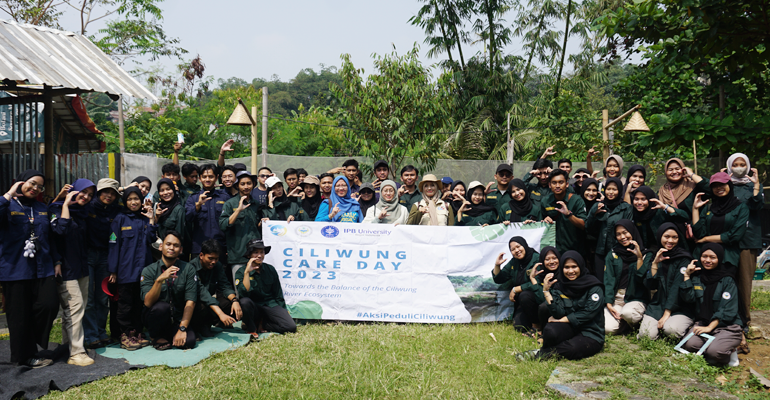Himasper FPIK IPB University Transports 1 Ton of Plastic Waste from the Ciliwung River

IPB University Water Resources Management Student Association (Himasper) held Ciliwung Care Day 2023, 27/8. This activity includes outreach related to waste management, planting trees on the banks of the Ciliwung River and cleaning the river from trash.
The Ciliwung Care Day activity was attended by various participants ranging from IPB University students, the Ciliwung Caring Community (KPC), Saung Bambon (Ciliwung Education Community), Ciliwung Pokdarwis, and residents around the Ciliwung River.
Ciliwung Care Day 2023 participants carry out routine activities of picking up trash around the river and in the middle of the Ciliwung river. This clean action managed to collect approximately 1.8 tons of waste.
Dr Fifi Diana Thamrin, IPB University lecturer said that the habit of throwing garbage into the river has a bad impact on the river. “Garbage thrown into rivers can cause rivers to siltation, so that they can clog rivers and cause flooding,” said Dr Fifi.
Meanwhile, Dr Majariana Krisanti alluded to several examples of rivers that have implemented a proper waste management system. In that area, the community has separated the types of waste by providing different bins.
“It doesn’t just stop at disposal, waste that has been disposed of can be recycled, if organic waste will be used as compost, while plastic waste is recycled into goods that can be used with economic value,” she said.
Apart from discussing waste management, Himasper IPB University also planted wood and non-timber tree seedlings. Planting seeds in collaboration with the Rumpin Nursery as a provider of seeds and the Forest Resource Conservation and Ecotourism Student Association (Himakova) IPB University.
At least 500 seeds were planted in the tree planting action on the banks of the Ciliwung River. The seeds planted consisted of teak, jengkol, sengon, soursop, guava and gmelina seeds. Some of the seeds were planted directly and some were handed over to the Ciliwung Pokdarwis team to be distributed to residents around the river. The purpose of planting these trees is so that the banks of the Ciliwung river can function as protectors and retaining soil from abrasion as well as a form of environmental preservation (IAAS/AMR).



